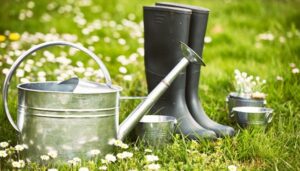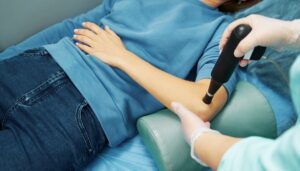Good Health Matters
May 2024
In Blooming Health!
The recent spring weather has prompted many of us to spend hours toiling in the garden. Gardening is a great form of exercise, but, as with other exercise, it comes with some associated risks. This month we talk about how to minimise gardening-related injuries.
Plus, if you’ve ever wondered about shockwave therapy and what it can do for you, we give you the lowdown.
Finally, we have a focus on women’s health. From pregnancy and pelvic issues to stress and sleep disturbance, we look at ways to boost your wellbeing this spring.
Enjoy reading!

Gardening: A Spring Delight or a Back-busting Chore?
Ah, spring! The birds are singing, the flowers are blooming, and the garden is calling! What could be more delightful than plunging your hands into the earth, coaxing tiny seedlings into life? Certainly not the subsequent plague of creaks and groans emanating from your muscles and joints. That initial burst of enthusiastic weeding can leave your back as stiff as a board, and your knees protesting with every bend.
Strains and sprains are as common amongst gardeners as weeds in the lawn. Let’s take a look at some typical issues and how to avoid them.
Low back pain: This is perhaps the most common complaint from our gardening clients, be it a grumbling, low-grade ache or a sudden, cataclysmic spasm. Early in the gardening season, unaccustomed effort – such as lugging bags of compost, digging, weeding, hoeing, or shifting plant pots – can wreak havoc on tight muscles and stiff joints.
Top Tips:
- Utilise helpful tools. Raised beds, wheeled pot stands, sack barrows or wheelbarrows, and long-handled tools all lighten the burden.
- Warm up. A few dynamic stretches, such as twists, high knee steps, and sidebends can prepare your back for the work to come.
- Stay warm. A chill breeze can stiffen muscles and reduce your flexibility. Make sure you’re protected from the cold, especially as you start.
Knee pain: Long hours spent crouched amongst the flower beds will have your knees complaining when you get up.
Top Tips:
- Keep moving. Knees love to move, so take a break and walk around the garden every 20 to 30 minutes.
- Get some padding. Use a cushioned kneeler or kneepads.
- Take the weight off. If your knees are swollen by the end of the day, rest with your legs up and supported, and use an ice pack.
Shoulder pain: overhead or reaching work, such as pruning or hedge-trimming, can be hard on the shoulders. Shoulder tendinopathy, bursitis or impingement are common conditions, and this kind of work can trigger a flare-up.
Top Tips:
- Prepare your body. Shoulder and arm circles, cross-body arm stretches, upper back twists and neck stretches can all help get the shoulders ready to work.
- Choose your tools. Use stepladders and long-handled tools where possible, to reduce the need to reach overhead.
- Chop and change. Trimming a long hedge? Do it in sections and intersperse with other jobs.
Wrists, elbows and hands: The small muscles and joints of the hand and forearm are common sites for overuse injuries such as tendinopathies.
Top Tips:
- Strengthen for resilience.Bending and rotating your hand while holding a small weight will build muscle to withstand the gardening season ahead. Choose a weight heavy enough that 10 repetitions feel mildly effortful, then rest and repeat twice more.
- Watch your grip. Gripping tools too tightly can cause strain and pain. Use tools with ergonomic handles. Make sure your gardening gloves are not too large – the sense of insecurity can make you grip harder.
Gardener’s health: Don’t overlook the other hazards gardening can present! Take a few moments to make sure you stay safe and well.
Top Tips:
- Sun safety.Use sunscreen, wide-brimmed hats and long-sleeved clothes to reduce your risk of future skin cancers.
- All exercise requires adequate hydration, and gardening is no exception. Keep a jug or bottle of water to hand, especially in warm weather.
- Allergies and infections. Be aware of possible allergens or irritants. Use gloves when weeding or pruning. Look out for biting or stinging insects. If you are at risk of anaphylaxis, make sure your EpiPen is obvious and within easy reach. Tetanus is a risk for gardeners – keep wounds covered and clean, and ensure your vaccinations are up to date.
We asked our physios and osteopaths for their best advice for gardeners. Here are a few of their thoughts:
“Your garden is like an outdoor gym, so treat it with respect! Use the same principles of strength, flexibility, nutrition and hydration that you would if you were competing in a sports event.” (Competitive gardening, anyone?)
“I treat quite a few keen gardeners who have arthritis – often in their knees or hands. Small tweaks like the right tools or compression gloves can be really helpful – as can a little regular treatment to keep symptoms under control.”
“Preparation is key. It only takes five minutes to do a whole-body warm-up, but that could prevent all kinds of injuries – it’s a few minutes well-spent!”
“Invest in some sensible equipment so it takes the strain instead of you…or a professional gardener, of course!”
Don’t forget, our team can help you both prepare for the rigours of gardening and rehabilitate any injuries or niggles you might pick up along the way.
Providing tailored treatment, advice and guidance to improve your strength and flexibility is what we do best. Book your spring MOT today!
Shockwave: Exciting Therapy for Chronic Pain

Have you ever wondered what shockwave therapy is all about?
Shockwave therapy has become known as a highly effective treatment for a range of soft tissue, bone and joint conditions, including plantar fasciitis (heel pain), lateral epicondylitis (tennis elbow), calcific tendinopathy and chronic low back pain.
Shockwaves are pulses of energy that are directed through the tissue to target areas of damage and injury.
The energy triggers a biological response at the cellular level, stimulating growth and healing.
It’s especially effective in chronic cases, where other types of therapy have failed to produce a result, because it gives a new kickstart to the healing process.
Here are some of your questions answered.
How does shockwave therapy work? A specialised, hand-held device is applied to the skin over the area to be treated. The device generates pressure waves that radiate through the body tissues to bring about a healing response. This mechanical stimulation is thought to work by increasing collagen and blood vessel growth, enhancing cell production, and reducing the release of pain-causing ‘substance P’ – an inflammatory chemical produced by the body.
What does the therapy feel like? Clients experience a pulsating sensation and a feeling of warmth at the application site. There may be some mild discomfort, and the area may redden and swell slightly. The therapist can adjust the intensity of the shockwaves to ensure it stays within your comfort level.
How effective is shockwave therapy? Research has indicated that as many as 91% of people treated for a variety of injuries have complete resolution of their symptoms. In our experience, many clients feel an improvement in their symptoms within one or two sessions.
Here’s what one of our clients had to say:
“I suffered with plantar fasciitis for almost a year despite attempts to eleviate it with rest, stretching, painkillers and anti inflammatories. My foot was painful when I stood or walked, especially after long periods sitting down. I booked an appointment with Seb who suggested I try shockwave therapy. After 3 appointments I was pain free. I’m happy to say I’m still pain free 4 months on. I’d definitely recommend the Good Health Centre for shockwave therapy for plantar fasciitis.”
Interested in trying shockwave therapy? Book a session today!
Good Health Centre News
We’re thrilled to announce that one of our regular patients, Mrs Mavis West, has been awarded an MBE in recognition for her outstanding work with children and adults with special educational needs. Mrs West received her award from Princess Anne on 16th April.
Mrs West founded the Yorkshire Association for Music for those with Special Educational Needs (YAMSEN) in 1980, and she is still the organisation’s President today.
Music has huge benefits for those with special educational needs. Rhythm and singing directly connects to motor control and speech, providing a way to enhance abilities, aid learning, and boost mood – all while having fun!
You can learn more about YAMSEN and its work here.
Congratulations from all of us here at GHC, Mavis!
 This month, we welcome back Pavan who has been away on maternity leave.
This month, we welcome back Pavan who has been away on maternity leave.
She is back with us from the 10th, offering Indian Head Massage and Reflexology treatments to ease tension and headaches, enhance calmness and clarity, and restore vitality and harmony.
We know many of you have missed Pavan’s fabulous healing hands, and will look forward to seeing her return! Book your session now.
The Wellness Edit
Spotlight on Women’s Health

Gynaecological issues, hormonal changes, pregnancy, labour and post-partum problems, stress, burnout, anxiety, sleeplessness – women can find themselves in need of specialist support and intervention at any time, age or stage.
Women are twice as likely as men to be diagnosed with an anxiety disorder. This may be in part due to hormonal variations across a woman’s life, which have been linked to mental health issues such as anxiety.
There are steps women can take, though, to protect themselves. Incorporating these elements into everyday life may make all the difference.
- Prioritise nutrition. Fuel your body with a diverse range of whole foods. Base your meals on wholegrains, fruit and vegetables, lean proteins and healthy fats. Not only will this support overall health, but a healthy eating plan, such as a Mediterranean diet, has been shown to reduce fasting cortisol levels, lessen insulin resistance, and both decrease the appetite-boosting hormone leptin and make the body more sensitive to it.
- Focus on sleep quality. The amount of sleep needed varies from person to person and with age. Listen to your body, increasing sleep time if you struggle to wake in the morning. Make sure you establish a consistent sleep schedule and sleep in a cool, dark room. Adequate sleep is crucial for hormone regulation, mood, and general health.
- Understand your menstrual cycle. Tracking your menstrual cycle can provide valuable insights into your hormonal health. Note the length of your cycle, symptoms you experience, and any irregularities. This information can be helpful for family planning, understanding potential hormonal imbalances, and navigating perimenopause.
- Exercise regularly. Alongside food and sleep, regular physical activity is the best medicine. You will see improved mood, stress reduction, better sleep, and support for hormonal balance. Aim for a mix of cardiovascular exercise and strength training.
- Manage your stress effectively: Chronic stress can significantly impact hormonal balance and mental wellbeing. Incorporate stress-reducing practices into your daily life. This might be mindfulness or meditation, yoga, socialising or spending time in nature. Finding healthy ways to cope with stress can positively influence your menstrual cycle, fertility, and perimenopausal symptoms, as well as managing anxiety and depression.
At GHC, we can provide dedicated and specialist support for women’s health issues. Osteopathy can play a significant role in helping women as they transition through the stages of life.
Our senior osteopath, Aisha, is qualified and experienced in helping women with:
- pelvic pain
- perimenopausal health
- bladder dysfunction
- pelvic floor weakness or tightness
- menstrual pain (dysmenorrhea)
- pregnancy pain (including symphysis pubis disorder, pelvic girdle pain, diastasis recti, back pain, sciatica, rib pain and breathlessness, and heartburn)
- post-partum pain or a ‘Mummy MOT’ check-over
- C-section or hysterectomy scar therapy
Aisha’s sensitive and gentle approach uses myofascial, cranial and visceral techniques to enhance tissue health, reduce congestion, ease pain and bring balance.
Here’s what our customers have said:
“I had an appointment with Aisha for a new mum MOT and had a range of issues that I presented her with. Aisha was quickly able to figure out what I needed to do to eliminate those issues. Aisha did a full body MOT, I have been for a new mum MOT before elsewhere and it was nowhere near as thorough as this. Really pleased with the professionalism and care taken by Aisha.”
Clinic Opening Times
We offer appointments from 8am to 7pm or 7:30pm on weekdays, except Tuesday when we open late till 9pm. And on Saturdays we’re here from 9am to 4pm. Here is a handy reminder of our opening hours:
| MONDAY | 8am to 7pm |
| TUESDAY | 8am to 9pm |
| WEDNESDAY | 8am to 7pm |
| THURSDAY | 8am to 7:30pm |
| FRIDAY | 8am to 7pm |
| SATURDAY | 9am to 4pm |
| SUNDAY | CLOSED |
Pricing Update
At GHC, we’re committed to providing excellence in what we do. We continually invest in our clinic so we can offer top-quality professional therapies, great service and a pleasant environment. To enable us to continue with this, we will be amending our pricing from July 1st.
We’re confident that this will continue to represent good value to you, our clients, and we’d like to take this opportunity to thank you for your support.
Our new pricing is listed below.
| INITIAL APPOINTMENT | SUBSEQUENT APPOINTMENT | |
| OSTEOPATHY | ||
| Principal (Ami Sevi) | £180 | £100 |
| Senior | £76 | £70 |
| Associates | £70 | £66 |
| Female Health | £98 | £70 |
| Shockwave Therapy | £75 | £75 |
| Shockwave Package x3 | £200 | — |
| PHYSIOTHERAPY | £70 | £66 |
| ACUPUNCTURE | £75 | £65 |
| MASSAGE | ||
| Remedial/Sports Massage | £75 | £75 |
| Holistic Re-balancing Massage | £75 | £75 |
| Pregnancy Massage | £75 | £75 |
| Swedish Massage | £75 | £75 |
| Indian Head Massage | £75 | £75 |
| REFLEXOLOGY | £75 | £75 |
| REIKI | £75 | £75 |


0 Comments